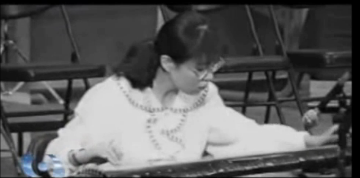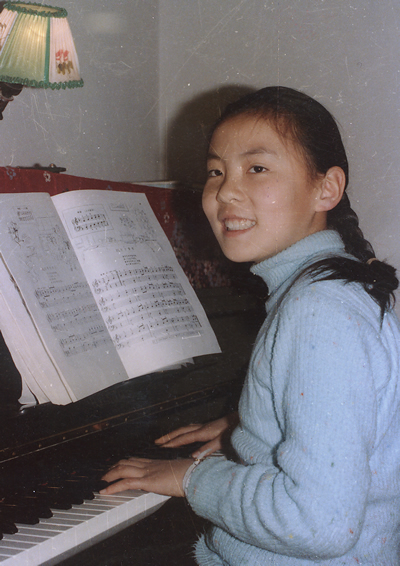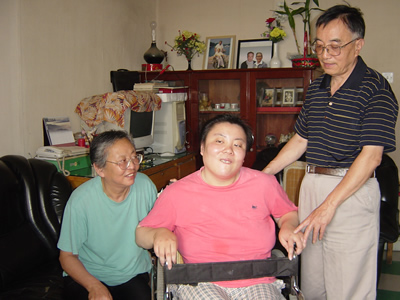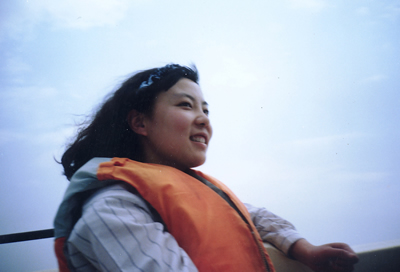The Heartbreaking Saga of Zhu Ling By Kevin Morris on May 16, 2013 http://www.dailydot.com/society/zhu-ling-sun-wei-petition-case/
In a grainy, black-and-white video of her final performance, Zhu Ling sweeps across the stage in a black skirt and white blouse before taking a seat behind a guqin, the six-stringed Chinese zither. She's been feeling sick recently, and you can tell she's a little nervous. But her fingers are precise. They pluck out a cautious melody. Zhu has no idea she's been poisoned.  A heavy metal is coursing through her body, brutalizing her neurological system. By the time the rare element is finally diagnosed and purged, Zhu will be physically ruined, her brilliant mind permanently damaged, her mental capacities reduced to that of a 6-year-old. She will forever be trapped in 1995, believing she's a student at China’s most prestigious technical university. A heavy metal is coursing through her body, brutalizing her neurological system. By the time the rare element is finally diagnosed and purged, Zhu will be physically ruined, her brilliant mind permanently damaged, her mental capacities reduced to that of a 6-year-old. She will forever be trapped in 1995, believing she's a student at China’s most prestigious technical university. She will miss everything that happens next. Zhu's story has straddled and defined two ends of the Internet revolution, connecting two decades, two continents, and two generations. She was probably the first person whose life was saved thanks to crowdsourced medical advice. Nearly two decades later, her case has become the subject of what may be the largest amateur online manhunt in history, as millions of strangers in two countries unite on message boards and social media to scour the world for the only suspect in her poisoning, a woman barely seen or heard from since 1995—her college roommate. … It all began with an SOS made of ones and zeroes. Dr. John Aldis was sitting in his home office in Washington, D.C., on April 10, 1995, when the message popped up on his computer screen. “Docs in China unable to diagnose this disease. HELP!!" Aldis had served 20 years as a doctor in embassies around the world, from Jakarta to Lagos and eventually Beijing. Towards the end of his four-year tenure in Beijing, he’d taken a tour of Peking Union Medical College Hospital (PUMC) with his friend Dr. Chen Dechang, head of the critical care unit. Chen told him about a patient who suffered from mysterious symptoms they were struggling to diagnose. The Usenet message had his attention immediately. This is Peking University in China, a place of those dreams of freedom and democracy. However, a young, 21-year-old student has become very sick and is dying. The illness is very rare. Though they have tried, doctors at the best hospitals in Beijing cannot cure her; many do not even know what illness it is. So now we are asking the world—can somebody help us? My god, Aldis remembers thinking. That's the same girl. He was no expert in toxicology, but Aldis knew people who were. He printed out the message and marched it straight to work at the state department the next day. Aldis wasn’t the only one digging into the mystery. First posted to thesci.med Usenet group on April 10, the message was jumping across phone lines and satellites at light speed, popping up on computer screens belonging to complete strangers across the world. In years to come, a thousand memes would propagate with the same kind of viral intensity. But to doctors poking around on the proto-Internet, this was an entirely new phenomenon. And it was deadly serious. In Los Angeles, toxicologist Ashok Jain would learn of the case from the teenage son of his department’s chair. Fellows at New York city’s world-famous poison control center, including 33-year-old Richard Hamilton, printed out the message and discussed it as an academic case study. At UCLA's School of Medicine, Xin Li, a China-born graduate student studying the untested field of telemedicine—sharing medical information over phone lines and the Internet—replied to the message. Keep me informed of what happened next, he said. He might be able to help. … 
A month earlier, Beijing University student Bei Zhicheng had received a phone call from an old friend. He’d better go visit Zhu, the friend said, because it might be the last chance to see her alive. Zhu and Bei had had grown apart after graduating high school and attending different universities, but Bei had fond memories of her. She was sweet and kind, a whiz at math and science, and a gifted musician. Stepping into her hospital room, Bei’s first reaction was to flee. His former classmate was half-naked, strung up with so many tubes she hung like a puppet. Her eyes bulged out in an expression of unbelievable pain. “I was terrified,” he later recalled. 
He paced the halls, trying to think of what he could do. Then he had an idea. His friend Cai Quanqing was experimenting with a new technology, just introduced to top universities and research institutions in China. Cai was one of the few students at Beijing University with an email address and access to Usenet groups. He asked Zhu’s parents if they would object to sending a message over the Internet, to spread her story to people all over the world. “Please try if you can," her mother said. On April 10, the pair copied their digital SOS into a window on the sci.med board. Then they clicked "enter." In Los Angeles, Doctor Jain immediately suspected thallium poisoning. The same answer came to Hamilton and the fellows at New York's poison control center. And when Dr. Aldis heard back from his trusted colleague at the state department, the answer was clear: thallium. More than 1,500 other replies, many from top toxicologists around the world, poured in. Bei and Cai had turned on a faucet that they couldn’t control. The information was coming so fast they could barely translate a message before another two or three appeared. But even as the responses overwhelmed them, they couldn't help but notice that one alien word appearing again and again. Thallium. … The 81st element on the periodic table looks like how you might imagine frozen mercury. Silver and delicate with a sharp metallic sheen, thallium is soft and malleable, giving with the ease of butter when cut. Called ta in Chinese, the metal does not exist free in nature, and it was unknown to science until 1861, when English chemist William Crookes noticed a strange residue left behind after making a batch of sulfuric acid. A year later, another chemist, Frenchman Claude-Auguste Lamy, figured out how to isolate the new element. Neither man had any idea they’d just discovered one of the most dangerous poisons in history. One gram of the stuff will kill you—slowly, painfully, over the course of two weeks. Since it’s odorless and tasteless, you can add a pinch to a drink and your victim will never know. Thallium competes with potassium, a key nutrient, replacing functioning ions with duds that just don't work. “It blocks energy production in the body at just about every level," Hamilton told me. "In neurons, in the gastrointestinal tract, in every organ system. “There's nothing it doesn't poison.” Dubbed the “poisoner’s poison,” thallium has long a been a favorite weapon for assassins and creative killers looking for a quiet murder weapon. It was Saddam Hussein's assassination tool of choice and a favorite of the KGB, too. For a long time, thallium sulfate was a common ingredient in rat poison, and murderous housewives baked it into treats or dropped a serving in tea. Between 1948 and 1953 in Australia, thallium poisoning almost became a fad; Sydney hospitals were overwhelmed with more than 103 cases of poisoning during the time period. Authorities slowly wisened up. Now thallium is illegal in most countries, its use restricted to a select few chemistry labs where researchers study its application in computer hardware and other high-tech fields. In 1995, only a few students and professors at Qinghua University had access to thallium. Zhu wasn’t one of them. … As the poison continued to ravage Zhu's body, Bei and Cai rushed to deliver their messages to the hospital. But the doctors were hesitant to believe diagnoses gathered from strangers over the Internet. Since Zhu didn’t have access to thallium, how could it possibly be the problem? They seemed unwilling to entertain the notion Zhu had been deliberately poisoned. For Zhu’s parents, the crescendo of voices from around the world was too much to ignore. They collected samples of their daughter’s blood and hair and sent them to a toxicology expert elsewhere in Beijing. Aldis remembers receiving the phone call April 28 from either Bei or Cai (18 years later, he can’t remember which) while he was at a medical conference in Hawaii. “It is thallium poisoning!” the voice shouted over the receiver. More than 1,000 times the normal amount. Now the PUMC doctors were willing to admit they needed urgent help: How should they treat her? UCLA grad student Xin Li ,27, stepped up as an impromptu coordinator, reaching out to Jain and Hamilton, of the Los Angeles and New York poison control centers, and translating their instructions for Beijing. He set up a website to track the case, (still available on the Internet archive) where he uploaded a rolling set of updates on her condition, as well as MRI scans of her brain and other medical documents. The American doctors urged administering the antidote immediately: Prussian Blue, a pigment frequently used in painting and inks. There was no medical Prussian Blue in the entire capital, the Chinese doctors soon discovered. Could they use the industrial dye from local factories? Yes, the Americans responded. On May 3, nearly a month after Bei and Cai’s Usenet plea for help, doctors finally began administering the antidote. Thallium levels plummeted and then rose and then plummeted again. At one point, Zhu’s mother noticed beads of blue sweat forming across Zhu’s skin. But the Americans said that was not unusual. She was sweating out Prussian Blue—and with it, the thallium. On May 9, the poison's levels were 21 milligrams per liter of blood, down from a high of 33. By May 12, the levels had dropped to almost zero. Zhu was cured. But the help had come too late. “She’s a girl with no brain and one lung," Aldis said. "She will never tie her shoelaces. She's severely neurologically bad off. Did we succeed?" Zhu was left nearly blind, permanently brain-damaged, confined to a wheelchair. For the rest of her life, she would depend entirely on her parents' care. 
For her family and everyone who had helped her, one question still lingered: Who poisoned Zhu? … There’s no real American parallel for Tianya. Launched in 1999, China’s largest Web forum has dominated the country’s Web culture for more than a decade, a petri dish for Internet subcultures but also a hub for China's mainstream Internet: Imagine 4chan and Reddit spliced with the old AOL launch page. In the 2000s, Tianya achieved a certain level of fame and notoriety for something called the “human flesh search engine,” a somewhat grotesque term used to describe China's unique brand of crowdsourced online detective work. In 2005, the human flesh search engine was let loose on Zhu’s case. It began on Tianya, with a single post from a user calling herself Skyoneline: “Ten years ago, while I was still in college, I heard about Zhu Ling’s story on the news." The case laid out by Skyoneline told a story of jealousy, corruption, and cover up, all pointing a finger at a woman named Sun Wei. Sun Wei was Zhu Ling's classmate, roommate, and teammate on the college folk music team. According to some Tsinghua students, Sun was doing a research with her professor at that time, and was the only student that had access to thallium. Besides, due to her close relationship with Zhu, she had the best chance and time to poison Zhu. (Translation via China Daily) The story was a lot more than hearsay. Police really did question Sun Wei in August 1995, but they released her after eight hours. In 1998, they dropped the case, citing lack of evidence Speculation on Tianya suggested something more sinister at play: Sun Wei had powerful family connections. Her father's cousin had once been deputy mayor of Beijing, and her grandfather was a close acquaintance of Jiang Zemin, China's president at the time. In China, guanxi, or personal connections, are a powerful cultural force, encouraging nepotism and favoritism, and perpetuating class disparities. In Sun’s case, Tianya users alleged, guanxi was enough to help Sun get away with murder. As the Skyoneline post set Tianya alight with conspiracy theories, old names resurfaced. Bei Zhicheng posted to the forum, asserting his own suspicions: “The police's suspicion was based on facts presented by Qinghua University: Sun Wei was the only student with access to thallium, and Zhu Ling's back-up on the Folk Music Team," Bei wrote. He continued: According to a retired officer with the Beijing Municipal Police Station, Zhu Ling's cup was found in a box under Sun Wei' s bed. The other thing I want to mention is the apathy shown by Zhu Ling's classmates. Nobody offered a hand when I asked them for help in translating the emails on Zhu Ling's illness we got from the foreign experts. Here was word from someone who had firsthand knowledge of the events, hinting both of a motive and perhaps conspiracy. Sun was jealous of her beautiful and talented roommate. And her friends refused to help the campaign to save Zhu’s life. Strangers began calling Sun’s family home. They hounded her old friends, too, the ones Bei accused of apathy: her former roommate, Jin Ya, her next-door neighbor, Li Hanlin, and Li's husband, Xue Gang. The tireless human flesh search engine appeared to be weighing Sun Wei down. After talking over the situation with her friends, she finally broke her 10-year public silence. She issued a statement—on Tianya: "I am innocent, and also a victim of the case,” Sun began, before suggesting that thallium was very easy to access at the university. “Sometimes, the laboratory was even left unlocked.” She added: “On the Internet, even though everyone has just a virtual identity, one should still be rational, objective and responsible for their own words and actions." Around the same time, a hacker broke into Sun’s email account and posted her conversations with her friends online. The emails revealed a sense of helplessness and a desire to to fight back, but Zhu’s supporters saw the discussion as a conspiracy to whitewash Sun’s image. Sun was fighting an impossible public relations battle: One woman and her friends against pretty much all of China’s Internet. After posting once more to Tianya, she apparently gave up. In the years that followed, she allegedly changed her name to Sun Shiyan and fled to the United States, where she goes by the name Jasmine Sun. Despite the groundswell of public interest in the case, it never reopened. It went cold as it was in 1995. ... The longer Zhu Ling’s poisoner remains unpunished, the deeper anger settles into the bones of China’s Internet. “The intelligent, diligent, multi talented, and beautiful Zhu Ling ... represents every Chinese parent’s dream and is every young Chinese student’s role model,” ChinaFiles Sun Yunfan wrote last week. “For 19 years many people in China have believed that her dreams were shattered by someone with a powerful family, and that justice could not be served because the ‘ruling class’ was above the rules.” Few things inspire Chinese populist rage as much as corruption; the case symbolizes the helplessness many Chinese feel in the face of a judicial and political system that bends to the will of the powerful. These tensions have always simmered under the surface, but the Internet provides a platform for anyone to sidestep censors and reach audiences in the millions. Private companies like Sina Weibo, China’s Twitter-like social media giant, employ small armies of censors to comply with government directives, but sometimes information simply moves too fast. Last year, social media exposed a half dozen sex and corruption scandals among Chinese officials. And in 2011, it proved a powerful force in revealing how graft and corruption helped cause a train derailment that killed 37 people. On April 15, 2013, a graduate student at Shanghai’s prestigious Fudan University fell ill and died. The similarities with Zhu’s 20-year-old cold case ago were obvious, except for one key detail: In Shanghai, police moved swiftly to arrest the murdered student’s roommate. A switch clicked in the Chinese Internet. Overnight Zhu’s name dominated conversation. The Beijing Security Bureau's Sina Weibo page became a lightning rod for online fury, as netizens littered it with invectives and complaints and demands to reopen the case. Celebrities with millions of followers helped fuel the fire, and soon Sina Weibo censors stepped in with a ham handed censorship campaign, deleting high-profile posts about Zhu Ling. That only spurred conspiracy—a sense of dread that the government was once more shirking justice in favor of the powerful. Wrote one Sina Weibo user: A powerful force has decided that microblogging related to Zhu Ling has become worthy of censoring and controlling, including those tweets written by celebrities and the People’s Daily. The force is so powerful it can withstand millions of microbloggers in pursuit of justice. (Translation via Bloomberg) By April 30, Zhu's name was a trending topic on Weibo, before suddenly disappearing. It’s not clear if Sina Weibo was acting on its own or if the government itself was directing censorship. A leaked memo acquired by China Digital Times, however, revealed Chinese officials were taking online chatter about the case seriously. The directives from the state's propaganda department demanded that Chinese media official police accounts of events be trusted implicitly: If producing reports concerning the thallium poisoning of Qinghua University student Zhu Ling, all media and website coverage must without exception accord authoritative information from the relevant Beijing municipal departments. Do not challenge [the information from the authorities] and do not sensationalize the story. As the state’s stranglehold began to settle in, it was almost natural for Chinese to once again look overseas for help. … Occasionally blocked in China and little known to most Americans, Huaren.us is a bustling message board catering to the the U.S.'s sizable Chinese population. Members have followed Zhu for years, but discussion heated up a few days after the Shanghai poisoning incident. Leaping off trailheads from mainland China, Huaren users trawled through the online footprints of Sun’s alleged accomplices (the “Thallium Party”). Li Hanlin and Xue Gang had long ago married and moved to the United States, launching successful careers in big pharmaceutical companies. Hanlin was formerly a principal scientist at Pfizer; Xue Gang recently began work Amgen. On the Huaren boards, details from the trio's social media profiles trickled in at constant pace: home addresses, phone numbers, emails, satellite photos of their houses, photographs of the couple and their young child. Their employers were hit with a deluge of phone calls and emails, most of which were some variation of this: I know Mr. Gang XUE through this crime and I know your company, Amgen, through this crime. I feel deeply sorry to see that your company, a prestigious image preciously created and maintained, is linked to this cruel, cold-blooded crime through Mr. Gang XUE, a dishonest, low morale and manipulating person. (Amgen declined to speak to the Daily Dot, saying it does not speak on the private affairs of its employees.) When Huaren users discovered the couple was posting their $400,000 Waterford, Conn., house for sale, they peppered the listing company with emails. Within a few days the listing agent had dumped it from the website. Both Xue and Li have since worked to scrub their trail from the Internet. “Although I'm a bit younger, Zhu Ling and I are from the same generation,” Huaren user chitchat told me. She’s been deeply involved in the campaign and told me she’s a naturalized U.S. citizen and a professor at an American university. “We could have shared similar personal joys [and] and dreams and professional ambitions. “Zhu Ling's aging yet resilient and respectable parents could have been mine.” Another branch of the Huaren campaign focused on publicizing the case to a U.S. audience, like a crowdsourced America's Most Wanted. They battled over Zhu Ling's Wikipedia page, eventually prevailing in ensuring that Sun Wei's role in the case was included. A dozen other Huaren users worked feverishly to translate a famous CCTV news report on Zhu Ling’s case, hoping it might hit the front page of YouTube. That never happened, but the video has been viewed more than 90,000 times and does provide one of the best English-language introductions to the case. http://www.youtube.com/embed/nJEdupyI97c?rel=0 “The production group doesn't want to create a wrong impression of a ‘Internet witch hunt,’” chitchat told me. The goal, she suggested, was to “push Sun and/or her accomplices to confess,” so their statements would stand as evidence for reopening the investigation. … The pressure on Sun boiled over on May 3, when her name landed on the White House's front steps. Thousands had flocked to an online petition started by Huaren user Y.Z., demanding the U.S. investigate and deport Sun Wei. (There’s still little solid evidence she lives in the United States. Sun has been an online ghost since 2006.) With more than 100,000 signatures, the petition easily gathered enough supporters to pass the White House's threshold for an official response. It’s not clear the Obama administration can do much of anything, however, beyond making a public statement; the Justice Department has no jurisdiction over foreign criminal cases. The campaign was always more about raising awareness than somehow forcing Obama’s hand, however. Back in the mainland, agitation from the public finally forced the Beijing Public Safety Bureau to release a feckless statement on its official Weibo account about the case. The police claimed Zhu's poisoning case was simply too old to effectively reopen, and things were handled correctly the first time around: “The dedicated investigation team worked according to law, and the investigation was never compromised or interfered with in any way.” Around the same time Sina Weibo finally lifted its censorship of Zhu Ling's name. For Americans, the Zhu Ling campaign may recall uncomfortable similarities to the vigilantism after the Boston Marathon bombing, when thousands of amateur Internet detectives scoured public footage of the attack and misidentified the bombers—twice. But China's judicial system works behind a veil made murky by political sensitivity and corruption. As Motherboard’s Alex Pasternack put it: Of course there is a risk to the vigilantism that Zhu's case has inspired. Crowdsourcing may be useful for diagnosing a disease, but as America's failed attempt to crowd-source the Boston bomber's identity demonstrated, it's not necessarily a very good way to solve a crime. In the wake of crimes like the Boston bombing, Americans can speculate about the power of the crowd to do that sort of thing; in China, sometimes there's no other option. There is another option. A private investigator is now on the hunt. Earlier this month, Huaren members chipped in $1,500 to hire to hire the U.S.-based PI, hoping he might be able to discover Sun Wei’s location and uncover alleged tax fraud she committed with her husband. Zhu Ling is now 40 years old. Her septuagenarian parents still take care of her everyday, flushing sputum from her lungs, massaging her legs, hooking her up to a respirator. "Things used to be so different," her mother told China Daily. "Before the tragedy all she brought me was joy. Her life would have been so promising if her plans had worked out. But now all that is lost. There's nothing left." 
Sun Wei will probably never receive a fair trial. But most of the Chinese-speaking world is making sure she'll be a fugitive the rest of her life. Donations to Zhu Ling's family can be sent via the Help Zhu Ling Foundation. For an excellent contemporary account of the case, check out Malcolm McConnell's excellent 1996 Reader's Digest article, "Rescue on the Internet," which provided some of the background information for this article. Check it out here (pages 1, 2, and 3). Illustration by Fernando Alfonso III |
